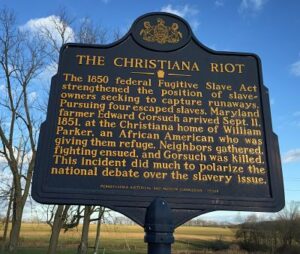These Black heroes of 9/11 valiantly battled terrorism.
But the sacrifices of these Black heroes will receive no recognition during the commemorations around America for the 20th Anniversary of what is considered the most tragic terrorist attack ever conducted on American soil.
These heroes, William Parker and his colleagues, confronted terrorists on 9/11 in defense of freedom and liberty – professed pillars of democracy in America.

Although badly outnumbered, these Black heroes successfully battled the armed terrorists whose onslaught included threats to employ a weapon of massive destruction.
While the anti-terrorism actions of Parker and his band of Black heroes did occur on 9/11 those actions did not occur on ‘that’ 9/11.
The so-called “Christiana Riot” on September 11, 1851, involved Parker and his band battling a group of slave catchers from Maryland who sought return of four Blacks who fled the enslavement of a Methodist minister in Baltimore.
The continued failure of America to recognize the contributions of these Black heroes constitutes a tragedy larger than 9/11 itself. This failure to learn from lessons these Black heroes taught is tied into many of the tribulations that now ravage America, domestically and internationally.
Most Americans know nothing about these Black 9/11 heroes, some of whom went on to fight in America’s bloodiest war.
Compounding this lack of awareness is the fact that the possibility of more Americans learning about these heroes is now under brutal attack across the country from conservative driven campaigns to kill instructional initiatives to educate about institutional racism like Critical Race Theory and the New York Times’ award-winning 1619 Project.
Actions of Parker’s band on September 11, 1851, made national news, far beyond the small village of Christiana, located about 50-miles west of Philadelphia in what is now Lancaster County.
The terrorism that Parker and his band battled in 1851 was the brand of deadly domestic terrorism that predates America’s “War on Terror.”
America’s most recent Terror War was launched in the wake of the September 2001 attacks on three sites including Shanksville in western Pennsylvania. A plane crashed in that small community on 9/11/2001 as passengers battled to thwart terrorist hijackers from using that plane to crash into Washington, DC.
That domestic terrorism faced by Parker and his colleagues was white racism – institutional and individual.
That terroristic racist scourge was denied in 1851 as it is today in 2021.
An example of that persistent denial of racism is the U.S. Senate’s current refusal to attack abusive policing that disproportionately devastates law-abiding African Americans. That current refusal on police brutality is similar to that body’s refusal to address abuses conducted through America’s Fugitive Slave laws that ravaged Free Blacks and those enslaved prior to the Civil War.
That slave owning Maryland minister was fatally wounded during the gunshot riddled skirmish with Parker and his band. That minister constantly demanded the return of his “property” – those escapees.
One of the minister’s sons suffered severe wounds. Other members of that slave catching gang fled for their lives, including a U.S. Marshall from Philadelphia. That Marshall had threatened to burn down Parker’s farmhouse. And he ordered members of the minister’s group to shoot Parker’s wife who was using a horn to summon assistance from Blacks in that area. Parker’s wife survived the bullet barrage unharmed.
African Americans in that area were organized to battle slave catchers who frequented the area to kidnap Free Blacks into slavery. Such kidnapping violated federal and Pennsylvania law, but federal officials refused to diligently protect Free Blacks from that abuse.
Parker knew the slave owner, his gang and the U.S. Marshall were headed to Christiana because of a spy network of Free Blacks in Philadelphia alerted them. The existence of such networks of Free Blacks assisting each other and enslaved Blacks is routinely overlooked aspect of U.S. History.
“History ignores the agency of Blacks,” said Robert Welsh, a Philadelphia lawyer who’s researched and written about that 1851 clash in Christiana.
Welsh said while that incident is referenced as a riot it was really “resistance.” Welsh, a former federal prosecutor said, “I think it was justifiable violence.”

William Parker was forced to flee to Canada, where his wife and their children joined him months after that 9/11 incident. While in Canada, Welsh said, Parker became a correspondent for the anti-slavery newspaper published by the legendary Frederick Douglass. Parker and Douglass first met as slaves in Maryland before their respective escapes.
Scores of Blacks and a few whites from Christiana were arrested on federal treason charges. However, all were freed during a trial in Philadelphia after months in pre-trial detention.
Whites around America reacted in outrage at that trial’s results. Whites in the South and North, including many in supposedly liberal Philadelphia, condemned the failure to punish those from Christiana they perceived as breaking the law that supported enslavement and denial of rights to Free Blacks.
Many historian cite that clash in Christiana as among the key incidents that triggered America’s Civil War.
Attorney Welsh also noted an irony – some of the Black participants in that Christiana incident fought for the Union during the Civil War…the same ‘Union’ that would not protect them from the daily reality of kidnapping into slavery before the Civil War.
The “Christiana Riot” exhibits how American law too often preserves institutional racism. Critical Race Theory examines the role of law in perpetuating racism.
This little known 1851 incident also exhibits the fact that so much of America’s true history is overlooked and/or deliberately suppressed.
“Black and white abolitionists and formerly enslaved Africans came together to protect the rights of enslaved Africans,” stated Dr. Diane Turner, curator of the world-famous Charles Blockson African American collection housed at Temple University.
“They were successful,” Turner stated, noting that 1851 encounter was among many instances of Blacks fighting for their freedom during the pre-Civil War era.
“One of the lessons that event offers us today is when citizens unite, they can overcome evil with good.”
